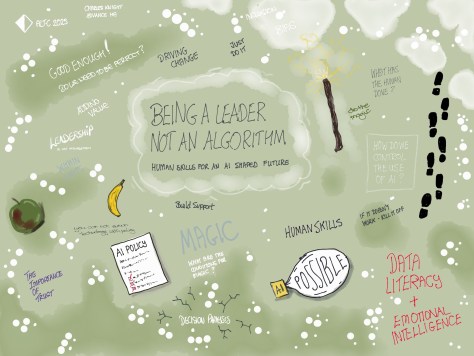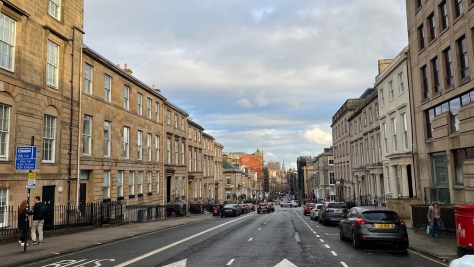This week I was in Glasgow for the Association for Learning Technology Conference (ALT-C). This year it is shorter.
While I was there I did a couple of sketch notes of two of the keynotes.
My sketch notes are really for me, rather than other people. The process of sketching allows me to digest for myself what is been talked about and demonstrated. The sketch note provides me with a mechanism that provides a process for my interpretation of what is being said and what I understand from the talk. The process of sketching engages me in the talk in ways in which note taking does for others or conversing on social media.
The first of these was from Charles Knight.
Being a leader, not an algorithm: Human skills for an AI-Shaped Future
Artificial Intelligence as a contested technology, is increasingly positioned as the solution to every challenge, from assessment to personalisation, efficiency, and leadership. In this keynote, Dr Charles Knight, Director of Leadership, Governance and Management at Advance HE, will explore the intersection of leadership and technology, asking: what uniquely human skills and behaviours ATL members need to thrive? Drawing on insights from leadership practice, digital innovation, and organisational development, this session will challenge assumptions and surface blind spots, and argue for a very human set of skills.
The second was the keynote by Gabi Witthaus.
Engaging Learning: Rethinking Inclusion with Insights from the Margins
This talk is about how learning designers can foster more inclusive student participation in online learning by considering four key dimensions of engagement—cognitive, behavioural, social, and emotional. Student engagement is important because it is correlated with retention, especially for students living in precarious circumstances. There is evidence that engagement in any one dimension can fuel engagement in the others—and the corollary is also true: disengagement in one dimension can cascade into others, fuelling broader disengagement. I will argue that while academia tends to value the cognitive and behavioural, for some students—especially those in contexts of conflict, crisis and displacement—social and emotional engagement may be critical to the successful completion of their studies.









